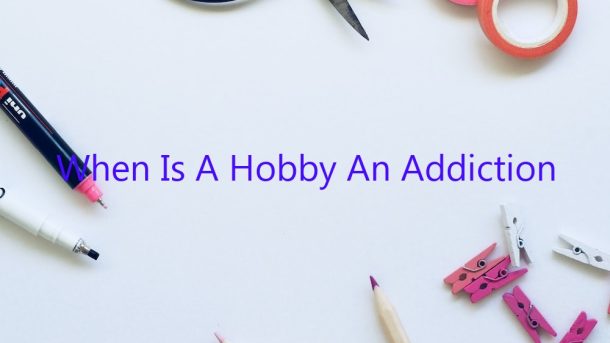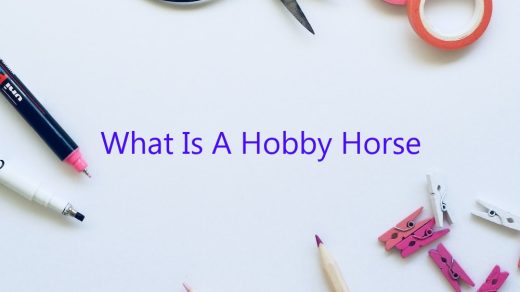When is a hobby an addiction?
For some people, a hobby can become an addiction. This means that they spend too much time and energy on the hobby, to the point where it disrupts their daily life.
There are a few key signs that can indicate if a hobby has become an addiction. Firstly, if you find yourself constantly thinking about your hobby, or if it’s the first thing you think about when you wake up in the morning, then it may be an addiction. Secondly, if your hobby is causing you problems in your personal or professional life, then it’s likely an addiction. Finally, if you feel like you can’t live without your hobby, then it’s definitely an addiction.
If you think that your hobby may be an addiction, it’s important to seek help. There are many resources available to help you, including addiction counselling and support groups.
Contents [hide]
What’s the difference between a hobby and addiction?
People often use the words “hobby” and “addiction” interchangeably, but there is a big difference between the two. A hobby is something that you do for enjoyment, while an addiction is a compulsion to do something that often has negative consequences.
Hobbies can be beneficial for your mental health. They can help you relieve stress and boredom, and give you a sense of accomplishment. Addictions, on the other hand, can be destructive. They can ruin relationships, financial stability, and health.
There are many things that can be addictive, including drugs, alcohol, food, sex, and gambling. However, not everyone who enjoys a particular hobby will become addicted to it. The key difference between a hobby and an addiction is the level of control that a person has over their behavior.
People who are addicted to something will often continue to do it even when it is causing them harm. They may be unable to quit, even when they want to. This is not typically the case with hobbies. People can and do quit hobbies when they no longer enjoy them or when they become too time consuming.
Addictions are often accompanied by withdrawal symptoms, such as headaches, nausea, and shakes. This is not usually the case with hobbies.
If you are concerned that you or someone you know may be addicted to something, it is important to seek help. There are many resources available, including addiction counseling and support groups.
How can an addiction be identified from a normal hobby?
An addiction can be identified from a normal hobby in a number of ways. The most obvious sign is that the person’s hobby is taking over their life, to the exclusion of other activities. They may spend an excessive amount of time and money on their hobby, to the point where it is having a negative impact on their health, relationships, work or studies. They may also become secretive and defensive about their hobby, hiding it from family and friends.
Addictions can also be identified by the way a person talks about their hobby. If a person is talking about their hobby in a way that suggests they are obsessed or addicted to it, this is a sign that it may be a problem. For example, a person who is addicted to gambling may talk about their bets in a way that suggests they can’t live without them. Similarly, a person who is addicted to drugs may talk about their next fix in a way that suggests they can’t survive without it.
If you are worried that someone you know may be addicted to their hobby, there are a number of things you can do to help them. The first step is to talk to them about your concerns. If they are able to admit that they have a problem, they may be willing to get help. If they are not willing to admit that they have a problem, you may need to take a more proactive approach and try to get them help yourself.
What counts as being addicted to something?
What counts as being addicted to something?
Addiction is a condition that is characterized by compulsive drug seeking and use, despite harmful consequences. It is a complex disorder, characterized by compulsive drug seeking and use, accompanied by functional and cognitive changes in the brain. Addiction is a brain disease that affects behavior.
Addiction is a chronic, relapsing brain disease that is characterized by compulsive drug seeking and use, despite harmful consequences. Addiction is a brain disease that affects behavior.
Addiction is a primary, chronic disease of brain reward, motivation, memory, and related circuitry. Addiction is characterized by impaired control over drug seeking and use,compulsive drugseeking, and use despite negative consequences.
Addiction is a brain disease that affects behavior
Addiction is a brain disease that affects how a person behaves.
Is gaming an addiction or hobby?
Gaming can be an addiction or hobby. It depends on the person.
Gaming can be an addiction for some people. They may become so obsessed with gaming that they neglect their responsibilities and ignore their friends and family. They may spend all their time and money on gaming, and they may start to feel withdrawal symptoms if they don’t game often.
Gaming can also be a hobby for other people. They may enjoy gaming, but they don’t let it interfere with their responsibilities or relationships. They may game occasionally and not spend a lot of money on gaming.
So, is gaming an addiction or hobby? It depends on the person.
Why do people get obsessed with their hobby?
Why do people get obsessed with their hobby?
People get obsessed with their hobby for many different reasons. For some, it’s a way to escape from reality. For others, it’s a way to connect with friends and family. And for others still, it’s a way to learn new things and challenge themselves.
No matter why people get obsessed with their hobby, it’s clear that it can be a very positive thing. Hobbies can help us escape from stress and boredom, and they can give us a sense of accomplishment and purpose.
If you’re looking for a way to improve your life, consider picking up a hobby. Hobbies can help you make new friends, learn new things, and have a lot of fun.
How do I stop obsessing over a hobby?
Do you find yourself frequently obsessing over your hobby? If you’re finding it difficult to enjoy your hobby in a healthy way, it might be time to take a step back and reassess your relationship with it.
Obsessing over a hobby can be a sign that you’re not comfortable with how much time and energy you’re investing in it. You might feel like you need to constantly think about your hobby and devote all of your time to it in order to be successful.
This can be damaging to your mental and physical health. When you’re constantly focused on your hobby, you’re not giving yourself time to relax and recharge. This can lead to stress and anxiety, which can impact your overall well-being.
If you’re struggling to break free from your obsessive thoughts about your hobby, it might be helpful to talk to a therapist. They can help you understand why you’re struggling and give you strategies to overcome your obsessive thoughts.
If you don’t want to see a therapist, you can also try to find a hobby support group. These groups can provide you with support and advice from other people who are also struggling with obsessive hobby behaviour.
Finally, it’s important to remember that it’s okay to take a break from your hobby. If you’re feeling overwhelmed or stressed, take some time to relax and recharge. This will help you come back to your hobby refreshed and ready to enjoy it in a healthy way.
What is the difference between habit-forming and addiction?
There is a lot of confusion about the difference between habit-forming and addiction. While both may involve habitual behavior, addiction is a much more serious condition.
Habit-forming refers to activities or substances that are regularly taken or used because they are pleasurable or provide some other reward. This can include activities like eating, gambling, or social media use. Habits can be helpful or harmful, but they are generally not considered to be addictions.
Addiction is a form of chemical dependence. It occurs when a person become physically and/or psychologically dependent on a substance or activity. This can lead to compulsive drug or alcohol use, gambling, or spending, among other behaviors. Addictions can be very harmful and even life-threatening.




